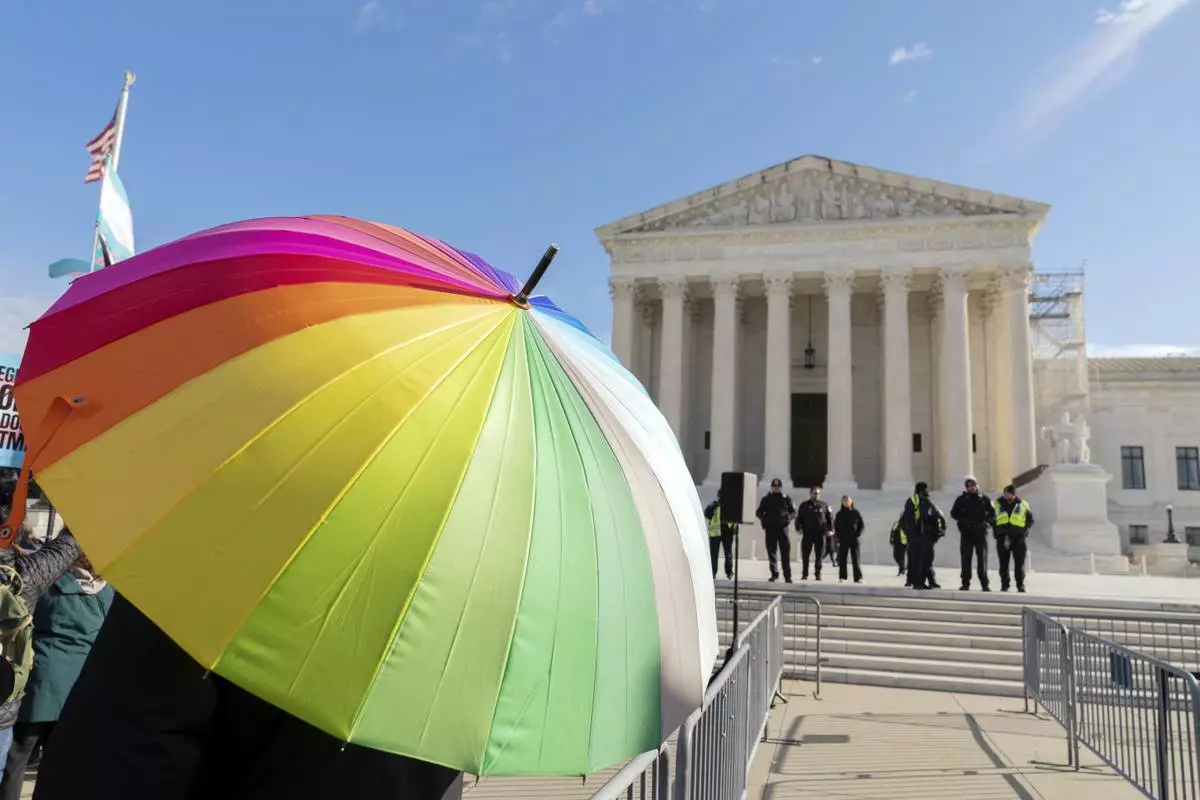One of President-elect Donald Trump 's most popular talking points during his campaign centered on the future of transgender athletes.
Trump revisited the topic multiple times in the months and weeks before the election, suggesting at his rallies that one of the goals of his second term would be to “keep men out of women's sports." Millions were spent on advertising that turned something that affects a tiny minority of competitors into a wedge issue.
More than half of voters overall — and the vast majority of Trump supporters — said support for transgender rights in government and society has gone too far, according to AP VoteCast, a survey of more than 120,000 voters nationwide.
What, exactly, Trump will do when he takes office on Jan. 20 is unclear. His transition team has not divulged any specifics, though the president-elect said during his campaign that the process would be “easy.”
In some ways, it might be. In others, things could be far murkier.
A lot. Trump seemed to identify the discussion around the rights of transgender people in general and trans athletes in particular as one that could garner both attention and support that went beyond his usual base.
Trump would often use language about gender identity that LGBTQ+ advocates say is wrong and harmful. He also falsely labeled two Olympic female boxers as men, and said their ability to participate in the Paris Games was “demeaning to women” even though both Imane Khelif of Algeria and Li Yu-ting of Taiwan were assigned female at birth and identify as women.
Trump ramped up the rhetoric as election day approached, telling the crowd at a Madison Square Garden rally in October: “We will get ... transgender insanity the hell out of our schools, and we will keep men out of women’s sports."
Trump has said on Day 1 that he would cut federal funding to "any school pushing critical race theory, transgender insanity, and other inappropriate racial, sexual or political content on our children.”
There are several layers to this, but the most immediate would be how his administration interprets Title IX, the law best known for its role in pursuing gender equity in athletics and preventing sexual harassment on campuses.
Every administration has the authority to issue its own interpretations of the landmark legislation. The last two presidential administrations — including Trump’s first — offer a glimpse at the push-pull involved.
Betsy DeVos, the education secretary during Trump's first term, issued a Title IX policy in 2020 that narrowed the definition of sexual harassment and required colleges to investigate claims only if they’re reported to certain officials.
The Biden administration rolled back that policy in April with one of its own that stipulated the rights of LGBTQ+ students would be protected by federal law and provided new safeguards for victims of campus sexual assault. The policy stopped short of explicitly addressing transgender athletes. Still, more than a half-dozen Republican-led states immediately challenged the new rule in court.
Trump could again shift the way the Title IX sports regulation is viewed and enforced.
“All Trump has to say is, ‘We are going to read the regulation traditionally,'” said Doriane Lambelet Coleman, a professor at Duke Law School.
Under the first Trump administration, the government interpreted “sex” as the gender someone was assigned at birth.
The Biden administration chose to interpret sex as “gender identity" under Title IX, which could be interpreted to protect trans athletes from being discriminated against if they wanted to participate in a sport that aligned with their gender identity, not their sex assigned at birth.
It is widely expected that Trump will roll back the definition of sex to align with the sex someone was assigned at birth.
That number is up for debate.
The NCAA, for example, does not track data on transgender athletes among the 544,000 currently competing on 19,000 teams at various levels across the country, though NCAA president Charlie Baker testified in Congress on Tuesday that he was aware of less than 10 active NCAA athletes who identified as transgender.
A 2019 survey of high school students by the Gay, Lesbian and Straight Education Network (GLSEN) noted just 5% of respondents said they participated in a sport that aligned with their gender identity.
It might be easier to do the math from a macro level. A 2022 report by the Williams Institute estimated about 300,000 high school-age students (13-17) identified as transgender. How many of those young people participate in sports is unknown, but it is likely a tiny fraction.
Still, any case of a transgender athlete competing — or even believed to be competing — draws outsized attention, from Lia Thomas swimming for the University of Pennsylvania to the just-completed season of the San Jose State volleyball team.
It varies from state to state. About half the states have enacted legislation that effectively bars transgender athletes from competing in the category that aligns with their gender identity.
The AP reported in 2021 that in many cases, the states introducing a ban on transgender athletes could not cite instances where their participation was an issue. When Utah state legislators overrode a veto by Gov. Spencer Cox in 2022, the state had only one transgender girl playing in K-12 sports who would be affected by the ban. It did not regulate participation for transgender boys.
“This is a solution looking for a problem,” said Cheryl Cooky, a professor at Purdue University who studies the intersection of gender, sports, media and culture.
The NCAA established a policy in 2010 that requires trans athletes who were assigned male at birth to complete at least one year of testosterone suppression therapy before being eligible to compete on a women's team. Trans athletes who were assigned female at birth and transitioned to male can compete on a men's team but if they have received testosterone treatment are ineligible to compete on a women's team.
The athletes are required to meet their chosen sport's standard for documented testosterone levels at various points during a season.
In 2022, the NCAA revised the policy in what the organization called an attempt to be aligned with national sports governing bodies (NGBs). If the NGB does not have a trans-athlete policy, then it scales up to the international federation that oversees the sport. If there is no international federation policy, previously established Olympic policy criteria would be followed.
The NCAA's decision to kick it up to the NGBs proved more restrictive in some sports like swimming. A policy introduced by World Aquatics in 2023 only allows transgender athletes to compete in women's races if the athlete can prove they have not experienced any part of male puberty.
That's at the NCAA-level. Things are far more definitive in schools that compete in the National Association of Intercollegiate Athletics (NAIA). The NAIA's Council of Presidents voted unanimously earlier this year to effectively ban transgender athletes from competing.
The International Olympic Committee has essentially passed the buck, deferring to the international federations for each sport.
That could change, however, when a new IOC president comes on to replace the retiring Thomas Bach.
Former track star Sebastian Coe, now the leader of World Athletics, is among the candidates up for election in March. Coe has been a strong proponent of limiting participation to cisgender women.
The near future figures to be volatile, with the state-by-state map on transgender athletes mirroring what abortion access looks like post-Dobbs. Democrats have been at odds about how to address the topic.
There is a chance that a Republican-led Congress could introduce another form of the “Protection of Women and Girls in Sports Act” that was proposed in 2021 and 2023. The 2023 version of the bill — which would prohibit school athletic programs from allowing individuals whose biological sex at birth was male to participate in programs that are for women or girls — passed the House but didn't make it to the Senate floor for a vote.
Republicans hold a slim majority in the Senate and remain short of the 60-vote threshold needed for passage, but given the white-hot discussion around transgender athletes the issue could come to the fore quickly. It could come even as Sarah McBride, a Democrat from Maryland, becomes the first openly transgender person in Congress.
AP Sports Writer Graham Dunbar contributed to this report.

Supporters for transgenders rights protest during a rally outside of the Supreme Court, Wednesday, Dec. 4, 2024, in Washington. The Supreme Court is set to hear arguments on the constitutionality of Tennessee's ban on gender-affirming care for transgender minors. (AP Photo/Jose Luis Magana)

FILE - Two teens challenging New Hampshire's new law banning transgender girls from girls' sports teams pose with their families and attorneys in Concord, N.H., Monday, Aug. 19, 2024, after a judge granted an emergency request to allow one of the girls to play soccer while their lawsuit continues. (AP Photo/Holly Ramer, File)

FILE- The San Jose State University Spartans line up for their NCAA Mountain West women's volleyball game against the Colorado State University Rams in Fort Collins, Colo., on Thursday, Oct. 3, 2024. (Santiago Mejia/San Francisco Chronicle via AP, File)










